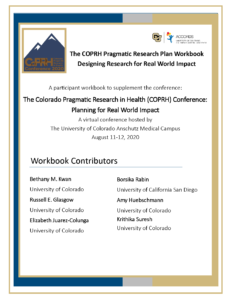Workbook
KATE GUASTAFERRO, PhD
 Assistant Research Professor, Methodology Center Pennsylvania State University
Assistant Research Professor, Methodology Center Pennsylvania State University
Dr. Guastaferro's program of research, situated at the cutting edge of prevention and intervention science, is devoted to the development, optimization, and evaluation of effective, efficient, economical, and scalable interventions with high public health impact, specifically focusing on the prevention of child maltreatment.
MICHAEL BAIOCCHI, PhD
 Assistant Professor, Department of Epidemiology and Population Health, Stanford University
Assistant Professor, Department of Epidemiology and Population Health, Stanford University
Professor Baiocchi, PhD, is an interventional-statistician, creating interventions and the means for analyzing them. He specializes in creating simple, easy to understand statistical methodologies for getting reliable results out of messy data and messy situations
MIRIAM DICKINSON, PhD
 Professor, Department of Family Medicine
Professor, Department of Family Medicine
L. Miriam Dickinson, PhD, is a Professor in the Department of Family Medicine, adjunct professor in the Department of Biostatistics and Informatics, a senior biostatistician in the Biostatistics Core of the ACCORDS Center for health outcomes research at the University of Colorado Anschutz Medical Campus, and Senior Scientist for the National Research Network of the American Academy of Family Physicians. With post-doctoral training in health services research and a PhD in biostatistics, she brings a strong methodological background to inform study design and apply rigorous methods and innovative approaches to practice-based research, study design, covariate constrained randomization, and the application of complex analytic methodologies to the challenges associated with cluster randomized pragmatic trials and stepped wedge trials. She has many years of experience as lead methodologist/evaluator and co-investigator on numerous federally funded grants focused on research in practice-based and community settings, as well as serving as PI on an NIMH R03 grant to use multilevel modeling to examine contextual effects on depression process of care in primary care practices.
DIANE FAIRCLOUGH, DrPH
 Professor, Department of Biostatistics and Informatics, Colorado School of Public Health
Professor, Department of Biostatistics and Informatics, Colorado School of Public Health
Diane Fairclough, DrPH, is a Professor in the Colorado School of Public Health. She received her doctoral degree in Biostatistics from the University of North Carolina and has held appointments at St. Jude Children's Research Hospital, Harvard School of Public Health, AMC Cancer Research Center and the University of Colorado Denver. She is a Past President of the International Society for Quality of Life Research and the 2012 recipient of their President's Award for her contribution to the field and the society. Her primary research interest is Quality of Life, outcomes in palliative/hospice care, and psychosocial sequelae of cancer and its therapy in pediatric and adult patients. Dr. Fairclough's statistical research interests include the analysis of longitudinal studies with non-random missing data due to disease morbidity or mortality. She has over 200 peer-reviewed publications and is the author of Design and Analysis of Quality of Life Studies in Clinical Trials, 2nd edition (2010).
ERIN CHAUSSEE, MS, PhDc
 Senior Professional Research Assistant, Biostatistician
Senior Professional Research Assistant, Biostatistician
Erin joined the ACCORDS Biostatistics and Analytics Core in 2014. She is currently a PhD candidate in the Department of Biostatistics & Informatics at the Colorado School of Public Health. Her research is in cluster randomized trials with a focus on stepped wedge designs.
LAURA PYLE, PhD
 Associate Professor, Director of Child Health Research Biostatistics Core Department of Pediatrics, University of Colorado
Associate Professor, Director of Child Health Research Biostatistics Core Department of Pediatrics, University of Colorado
Dr. Pyle is the Director of the Child Health Research Biostatistics Core at the University of Colorado Anschutz Medical Campus. She collaborates with investigators on research mainly related to obesity, type 2 diabetes, and type 1 diabetes, helping them design and conduct rigorous research protocols, with a particular focus on clinical trials and longitudinal observational studies.
ELIZABETH JUAREZ-COLUNGA, PhD
 Assistant professor in the Colorado School of Public Health
Assistant professor in the Colorado School of Public Health
Dr. Juarez-Colunga is an assistant professor in the Colorado School of Public Health. She received her BS in Applied Mathematics and MSc in Statistics in Mexico, and her doctoral degree in Statistics from Simon Fraser University in Canada. Elizabeth’s areas of expertise and interest include: (i) analysis of data with dependencies at different levels including longitudinal and clustered data, which builds upon generalized linear and nonlinear mixed models, (ii) analysis of repeated events data such as pulmonary exacerbations, which evolve as extension of survival analysis methods, (iii) joint modeling of multiple outcomes, and (iv) analysis of observational data. She has been involved in the design and analysis of several health outcomes research studies, including for instance, the The Scalable Architecture for Federated Translational Inquiries Network (SAFTINet) project, a pragmatic trial to assist weight loss in a low-income population, and several observational studies in surgical outcomes.
